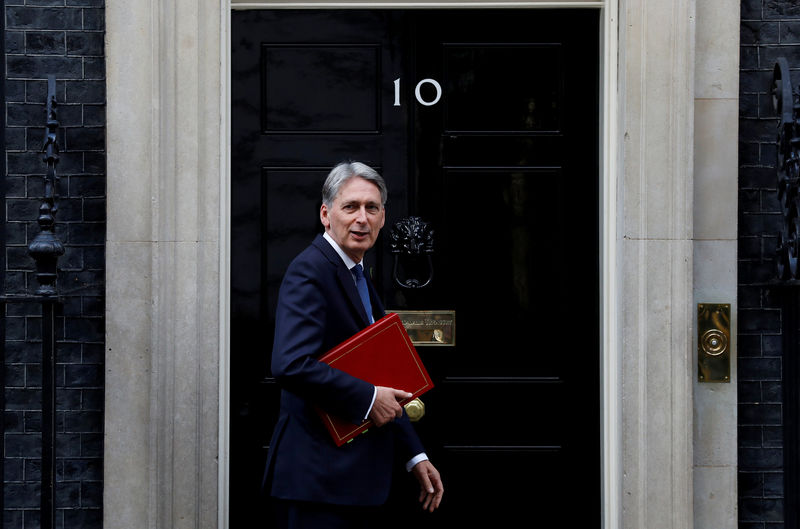By William Schomberg
LONDON (Reuters) - Chancellor Philip Hammond is under pressure to turn around the fortunes of Prime Minister Theresa May but with Brexit weighing on the economy he has little room to revive her fortunes with his budget next week.
Britain's economy is expanding at half the rate of Germany, inflation is running at its highest since 2012, wages are being squeezed and the economic slowdown is expected to get worse as the country's departure from the EU in March 2019 nears.
In what is likely to be his last full budget plan before the terms of Brexit are hammered out, Hammond is also expected to have less money to spend in the coming years than he thought only a few months ago.
Britain's budget forecasters are poised to cut their economic growth outlook due to persistently weak productivity, eating into the cash that Hammond had hoped to keep in reserve for any Brexit turbulence ahead.
At the same time, May needs something eye-catching to shore up her leadership of a deeply divided Conservative Party when Hammond delivers his budget in parliament on Nov. 22.
May has made little headway in Britain's high-stakes Brexit talks, and the resignation of two ministers this month has added to the sense of crisis in Westminster since she lost a parliamentary majority in a June election.
Hammond is also on thin ice. He was reportedly on the verge of being sacked by May before she was weakened by the election and he is in the sights of pro-Brexit Conservatives who say he is undermining Britain's hand in negotiations with Brussels by not spending now for a possible "no-deal" Brexit.
The popular Sun newspaper accused him of "suffocating caution" in an editorial on Tuesday. "This is a time for courage and imagination, not miserly bean-counting," it said.
But Hammond has almost no scope for big tax cuts or a big increase in investment, unless he tears up his budget rules under which he is aiming to turn the deficit into a surplus by the mid-2020s.
Ratings agency Moody's cut Britain's credit rating in September, saying plans to reduce its heavy debt load had been knocked off course by Hammond's slower approach to fixing the deficit than that of his predecessor George Osborne. It also said Brexit was likely to weigh on the economy.
"If I were the chancellor, I would be announcing lots of strategies and reviews and probably trying to do as little as possible, given the limited room for manoeuvre," Conservative lawmaker Nicky Morgan said.
"The politics of the budget are going to be as important or more important than what is said economically," said Morgan, who heads a committee that scrutinises the work of the Treasury.
Many voters are tired of seven years of spending restraints imposed by former chancellor George Osborne following the financial crisis, and then by Hammond when he replaced him after the Brexit vote in June last year.
Households have suffered the worst income squeeze since the early 19th century, by some estimates, fuelling support for the left-wing opposition Labour Party and its big spending plans.
BOXED IN
But Hammond has flatly rejected proposals from a fellow minister to fund a major house-building drive to respond to the frustrations of many younger voters who feel priced out of the property boom that helped their parents.
Instead, he is reported to be considering a more modest plan to reduce a tax on home purchases for first-time buyers.
Similarly, Hammond is unlikely to inflict much pain on wealthier voters who are the main beneficiaries of a steadily rising threshold for paying income tax and who enjoy generous help from the tax man for their private pensions.
Protests from Conservative MPs forced Hammond into a U-turn in March when he dropped a plan to increase national insurance contributions for self-employed workers.
In a nod to the concerns of many businesses, Hammond is likely to reduce the pace of increases in a tax businesses pay on the property they use, newspapers have said.
But many economists say Hammond could make things easier for himself if he adopts Labour's call to exclude borrowing for infrastructure investment from his budget deficit targets.
More investment in transport and digital networks, for example, could help improve Britain's productivity problem and eventually bring the government more tax revenues.
"There is no reason at all why we need to stick with the fiscal rules as they are," Matt Whittaker, chief economist at the Resolution Foundation think-tank, said.
"Borrowing costs are so low at the moment that most if not all economists think we should be borrowing more to invest. The fact that we are not is really a missed trick."
But investors say Hammond cannot afford to be complacent, given Britain's large current account deficit which requires funding by foreign investors.
If Britain falls into another deep recession, or leaves the EU without a trade deal, investors might take fright, Robert Wood, an economist with Bank of America (NYSE:BAC) Merrill Lynch, said.

"As long as the music is playing, the UK can keep dancing. The question is what happens if the music stops?" Wood said.